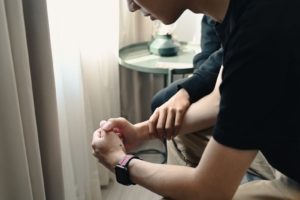5 Ways to Support Your Loved One With PTSD
PTSD affects a person’s mood, physical health, and outlook on life. It can take years to heal , and it affects every aspect of a person’s life. Loved ones can make all the difference in a person’s journey through PTSD, but it’s not always easy to know how to help. Sometimes, we may think we are doing something good when we are unintentionally causing harm. Understanding how to offer the right kind of support is key. Newport Beach Christian Counseling can help guide both those experiencing PTSD and their loved ones through this complex process, ensuring everyone has the tools they need to heal together in a healthy, supportive way.
There are five things everyone can do to help their loved one navigate PTSD. These things might not feel natural to do and some of them take practice and patience to implement. What counts is that you are learning, trying, and being patient as you try to help.
How to Help with PTSD
Go slow and let them determine the pace
After experiencing trauma, most people want to feel safe and comfortable as they process the experience and try to heal from it. This might cause them to become insular or even isolated. In the context of a relationship, they might seem cold, distant, and detached.
It’s alarming to feel distance from a loved one. What is important to remember is that their actions are not personal. They are simply trying to cope with the aftermath of trauma. If it is their first time dealing with PTSD, they likely don’t know what they are doing and might be afraid, overwhelmed, and unbalanced. Let them take the lead and set the pace so that they can begin to feel in control of their lives once more. This is their first step on the path to healing.
Don’t be surprised by outbursts or unusual behavior
 One of the effects of PTSD is on a person’s nervous system. Ordinary places like shopping malls or crowded venues like churches might suddenly trigger them. Certain smells, flavors, or sounds might make them jumpy or repulsed. They might even display symptoms of dizziness or clumsiness from time to time.
One of the effects of PTSD is on a person’s nervous system. Ordinary places like shopping malls or crowded venues like churches might suddenly trigger them. Certain smells, flavors, or sounds might make them jumpy or repulsed. They might even display symptoms of dizziness or clumsiness from time to time.
It’s worrying to see these behaviors in people who previously never acted like this. PTSD causes many triggers that are impossible to control at first. Your reaction to this behavior can either help or harm them as they try to understand their triggers and how best to react to certain stimuli. Reassure them that you are not judging them and try to help them as they learn their triggers.
Remind them that they are loved
Our grandparents once taught us that “words will never hurt us,” but sadly, this is not true. People are often ashamed to be dealing with PTSD on top of the existing emotions stemming from their trauma. They might feel deep embarrassment, shame, guilt, and even self-loathing over the events in their past. It is often these emotions that present the biggest hurdles to healing.
They need to hear your verbal affection and pledges to stick with them, regardless of the complications. They need to hear that they are loved and lovable. Any promise must be backed up by action, so show up for them again and again.
Encourage them to get extra support or treatment
Shame and guilt often keep people from getting help, although there may be several reasons why your loved one does not want to get help. Sometimes, it’s simply a matter of not knowing where to go or what help is available.
You could help them by talking to them about therapy and counseling. If they are open to it, you could help them look into the availability of therapists, support groups, counselors, and other resources.
Educate yourself on PTSD and complex trauma
PTSD and CPTSD are complex issues. One of the best ways to help a loved one is to research these topics and learn about the science and emotional impact of them. This will help you understand what your loved one is going through and why they are acting the way they are. It will also help you know how to communicate with them and give them the specific care they need most.
Caring for a loved one with PTSD can be difficult, and many people are wary of adding to the trauma their loved one is facing, even accidentally. Sometimes, we just need to know that everything is “normal” even though it doesn’t feel like it.
Finding Support Through Trauma Therapy
Every helper needs support of their own. A counselor is an important addition to make for both your loved one with PTSD and for yourself. A therapist at Newport Beach Christian Counseling can give you the assurance you need, as well as long-term support.
If you are interested in meeting with a Christian counselor, contact us at Newport Beach Christian Counseling in California today. We will arrange a visit with a qualified therapist. They will lend their support to you as you care for and cope with your loved one’s PTSD.
“Depressed”, courtesy of Getty Images, Unsplash.com, Unsplash+ License




